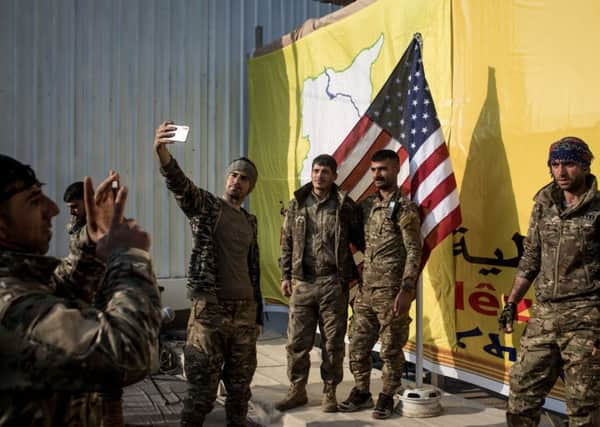Azeem Ibrahim: Beware terror attacks after ‘defeat’ of Isis


To understand why this is the case, we must understand what made it so successful in the first place. The so-called Islamic State grew out of an al-Qaeda affiliate in Iraq, from where it expanded into the security void opened up by the Syrian Civil War. But Isis was unlike any previous al-Qaeda offshoots. Al-Qaeda measured success by the number of terror attacks and the targets it managed to hit, Isis measured it by the amount of land it controlled. At its peak, that stood at a dazzling 34,000 square miles.
The audacity of trying to build a state and its initial apparent success completely revolutionised the global jihadist movement. Success breeds success, foreign and local young Muslims flocked to join the marauding army, and that army soon ruled over more than 10 million people, raising over $800 million a year in taxes.
Advertisement
Hide AdAdvertisement
Hide AdThe problem with having a territory, however, is that you are a sitting target. And while Isis could fight off the divided, dysfunctional land armies of Baghdad and Damascus, they never really stood a chance once the US, Russia, Iran, Turkey and the Gulf allies weighed in.
The only reason Isis lasted so long was because the other players on the battlefield were fighting their own fights, with Isis at most an incidental nuisance.
But there remain tens of thousands of fighters sworn to the Isis flag in the Levant and beyond, from Libya to the Philippines. They cannot all be expected to lay down their weapons willingly and become civilians.
Most fighters in the Levant will shift towards other fronts in failed states with Isis outposts. The most obvious destination would be Afghanistan. But as governance is fragile in large swathes of the Middle East, and new areas where states are unable to assert control can always emerge, these fighters are likely to have places to go for the foreseeable future.
Others will revert to the al-Qaeda playbook: run terrorist attacks in stable states in the Middle East and the West, combined with renewed efforts to proselytise.
This route will be available especially to western-born fighters, who can often return to their countries of origin and undermine the security of these countries.
Terror attacks will be especially attractive as returning fighters will probably want to sustain the Isis brand after a symbolically significant defeat. Isis must remain relevant or it will die. Terror attacks are the most immediately available means to keep the brand in the public eye.
The most concerning issue is that the group still has substantial funds at its disposal, which will make both terror and radicalisation operations in the West more sophisticated – and thus more likely to succeed.
Advertisement
Hide AdAdvertisement
Hide AdIsis is down but it is far from out. It will revert to terror attacks, but the hardcore of the group will be seeing the loss of the Levant as just a temporary setback. They will be looking to retrench, bide their time and wait for an opportunity to establish a new “state” somewhere in the Islamic world.
And whether they return under the label of Isis, and whether they will still be looking up to their “Caliph”, Abu Bakr al-Baghdadi, is beside the point. The root Wahhabist ideology from which al-Qaeda and Isis sprang is still influential throughout the global Muslim community – and still generously funded by Wahhabist organisations. The material conditions of poor governance, social inequality, ethnic strife and demographic imbalances which have fed the endless conflict in the Middle East continue to be pervasive. And the geopolitical power plays between Iran, Saudi Arabia, Turkey and Pakistan will continue to fan the flames of sectarian conflict.
Global jihadism is a hydra, fed by a diverse array of causes. All we have achieved is to cut the hydra’s most visible head. But the hydra yet lives.
Dr Azeem Ibrahim is a research professor at the Strategic Studies Institute, US Army War College, author of Radical Origins: Why We Are Losing The Battle Against Islamic Extremism, and a former UK government counter-extremism adviser